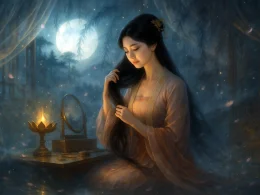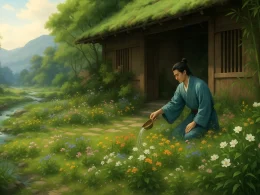Willows slant before my hermit's window pane,
Scatter'd withered twigs along dawn's river stain.
Where the frosty wind snaps branches in its flight,
Pairs of cold gulls startle into startled flight.
Original Poem
「冬柳」
陆龟蒙
柳汀斜对野人窗,零落衰条傍晓江。
正是霜风飘断处,寒鸥惊起一双双。
Interpretation
Lu Guimeng, a recluse-poet of the late Tang Dynasty, long dwelled in Jiangnan, living by farming and fishing. He was as renowned as Pi Rixiu, and the two were often referred to as "Pi-Lu." He frequently used natural imagery to express his aspirations and personal reflections. "Winter Willows" is one of his representative lyrical poems on objects. Willows in poetry often symbolize parting sorrow and rootlessness, and this work, set by a winter river with sparse branches and startled gulls, conveys the poet’s aloof and resilient character as well as his lucid perception of worldly affairs.
First Couplet: "柳汀斜对野人窗,零落衰条傍晓江。"
Liǔ tīng xié duì yěrén chuāng, língluò shuāi tiáo bàng xiǎo jiāng.
The willow bank slants opposite my wildman’s window;
Withered strands lie scattered by the dawn river.
The opening self-identifies as "wildman’s window" (野人窗 yěrén chuāng), highlighting the poet’s reclusive life by the river, far from worldly noise. The decaying willow strands and the cold dawn river reflect both the winter scene and the poet’s state of mind: solitary, chilly, and tinged with melancholy.
Second Couplet: "正是霜风飘断处,寒鸥惊起一双双。"
Zhèng shì shuāng fēng piāo duàn chù, hán ōu jīngqǐ yīshuāngshuāng.
Just where the frost-wind snaps and tosses them,
Cold gulls startle and rise in pair after pair.
The latter couplet shifts from stillness to motion: the frost-wind tears the willow strands, and the cold gulls take flight. The sound of wind and birds breaks the morning silence, creating dynamic beauty. "In pair after pair" (一双双 yīshuāngshuāng) is highly visual, depicting the gulls’ vitality while hinting at lingering life amid solitude—a sharp contrast to the withered willows.
Holistic Appreciation
This poem paints a small scene by a winter river: cold wind, sparse willows, the dawn river, and a flock of gulls. With concise language, the poet creates a cold yet vivid picture. The first two lines describe stillness; the latter two capture motion—each enhancing the other. The willows’ decay mirrors rootless fate; the gulls’ startled flight reflects inner restlessness. The tone is chilly but not entirely lifeless, for the paired gulls convey a spirited vitality, echoing Lu Guimeng’s integrity and resilience despite adversity.
Artistic Merits
- Dynamic-static interplay: The first couplet depicts the static scene of winter willows; the second captures the dynamic movement of gulls, enriching the tableau.
- Emotion through scenery: "Scattered" willow strands allude to the poet’s frustration and aloofness in the late Tang context; the startled gulls mirror a rootless state of mind.
- Precise diction: "Scattered" (零落 língluò), "withered strands" (衰条 shuāi tiáo), "snaps and tosses" (飘断 piāo duàn), and "in pair after pair" (一双双 yīshuāngshuāng) are vivid and immersive.
- Profound imagery: Willows traditionally symbolize parting and decay; gulls represent solitude and wandering. Combined, they convey the poet’s personal and era-aware reflections.
- Crisp and unadorned style: The plain, austere language suits Lu’s "recluse-poetry" ethos, revealing his independent spirit.
Insights
This poem reveals that natural scenes are not merely physical realities existing independently of us; they can become vessels for the soul. Through the willows and gulls, the poet expresses the desolate, rootless state of late Tang literati, as well as their unwavering integrity in solitude. For contemporary readers, it inspires us to draw strength from nature in times of adversity—like the “pairs of cold gulls” taking flight—and to write of life’s tenacity with a resilient brush, even amidst decay.
About the poet

Lu Guimeng (陆龟蒙 ?– c. 881 CE), a native of Suzhou, Jiangsu, was a Late Tang dynasty writer and agronomist. After failing the imperial examinations, he retreated to a reclusive life in Puli, Songjiang. He formed a famous literary partnership with the poet Pi Rixiu, and the pair are often referred to collectively as "Pi-Lu." His poetry is known for its social satire and a style that is incisive yet subtly restrained. His inclusion in the Biographies of Talents of the Tangunderscores his significance. The modern writer Lu Xun famously praised his essays, noting that they provided "a sharp radiance piercing through a world of muddle". Lu Guimeng is regarded as a uniquely distinctive voice in the literary scene of the late Tang.












